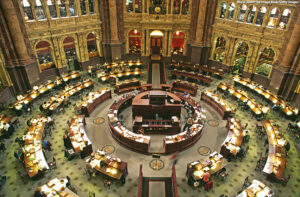Library of Congress Transcription Campaign for Post-Civil War Petition
The Library of Congress By the People program uses the power of the internet to make historical documents and historical research more accessible, readable, and searchable. In March 2023, the Library of Congress began a new campaign to learn more about a post-Civil War petition calling for equal rights for African Americans. A petition is a request for action made to a government body or public official. It includes signatures to demonstrate public support for the requested action.
Written in 1865, Petition of Colored Citizens of South Carolina called for equal rights, full citizenship, and voting rights for African Americans. The manuscript consists of an introductory page addressed to Congress followed by over 54 feet of pages of signatures glued together. The By the People program asked volunteers to use digital images of the petition manuscript to transcribe, or record, the handwritten text. Then other volunteers reviewed the transcribed text for accuracy and completeness. Finally, the texts were tagged with keywords.
The Importance of Petitions
The Petition of Colored Citizens of South Carolina manuscript has been held at the Library of Congress since 1939. It is part of the Justin S. Morrill Papers collection. Morrill was a politician from Vermont who served in the U.S. Congress from 1854 to 1898. But Senator Morrill was not the member who introduced the petition. Congressional records show that Senator Jacob Merritt Howard introduced the petition in the U.S. Senate on December 21, 1865. He referred it to the Joint Committee on Reconstruction. Morrill served on this committee, so the petition could have come into his possession after the Congressional review.
During this time period, almost all African Americans were denied the right to vote. But they did make use of the First Amendment right to petition. Petitioning gave African Americans a way to express their opinions, persuade legislators, and influence legislation. This 1865 petition was one of thousands of anti-slavery and equal rights petitions that African Americans submitted to local, state, and federal legislatures.
Making Historical Documents More Accessible

Historical documents, like the South Carolina petition, used to be rarely seen by most people. To preserve them, these delicate artifacts are stored in archives or museums. The South Carolina petition, for example, has been in the Library of Congress archives for almost a century. It was put on public display in the recent “Reconstructing Citizenship” exhibition at the National Museum of African American History and Culture. Institutions have recently worked to increase access to these items by creating online databases of digital images of historical documents. Since the handwritten text can be difficult to read, transcribing these texts allows more people to read them. When placed into online databases, the transcriptions make the text of these historical documents searchable by keywords or names. Also, the transcriptions allow people who use screen readers or other assistive technologies to interact with these texts more fully. Through the Library of Congress By the People program, virtual volunteers have transcribed and tagged over 620,000 pages of historical documents since 2018!
Dig Deeper Look at the images of the Petition of Colored Citizens of South Carolina in the Library of Congress database. How might transcribed text help you better understand the document?
